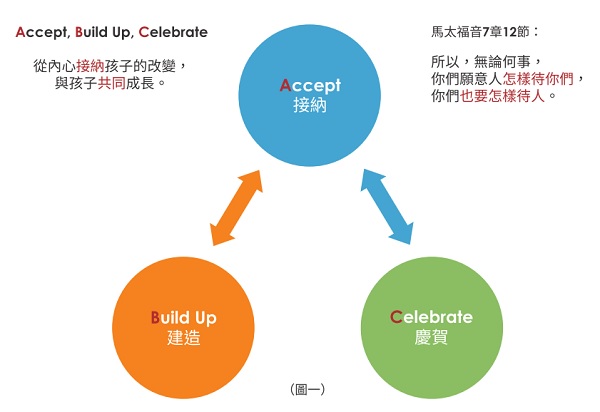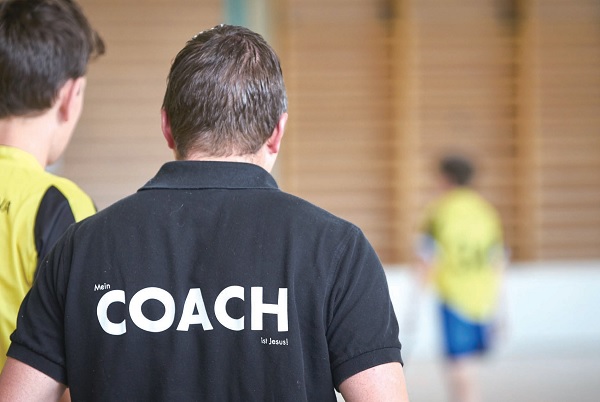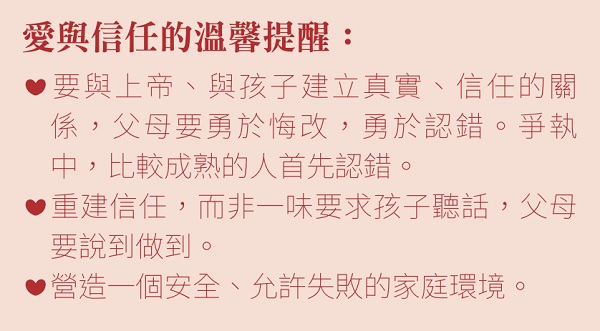Connect with heart, believe and obey
[Mobility in Heaven—Parents and Children] Series 3
Oral narration and photos provided╱Chen Dejian‧Interview╱Lin Minwen

"As soon as my sweet baby enters puberty, he gets angry at every turn. Is he starting to be rebellious?"
"Why are teenagers so disobedient? Is this rebellion?"
When it comes to adolescent children, I believe many parents have heard and said similar things. Does youth have to be rebellious? How do parents deal with a child who no longer seems docile? How can parents and children interact?
In fact, no matter how old the child is, the foundation of the parent-child relationship is still "faith out of love and act out of faith." The way to maintain the relationship is to "discover love, accept love, and share love" together. When teenagers and children show a desire to push away or even overthrow their parents, authority, and established patterns, and feel that when they close the door to their room, they also close the door to their heart. I hope that their parents can open their own heart door first, let the light of God’s love in, and communicate with each other from the heart. God connection. Then use the warmth and love from God to connect with the children's hearts, so that parents and children can rebuild their trust in God and each other in front of the gracious Lord Jesus, so that they can trust and obey.
Generally speaking, when it comes to the parent-child relationship, parents are often asked to "look outward" and given various ways to manage their children. Parents are encouraged to "look inward", jump out of their blind spots, and look back into their hearts. When the parents' hearts change, the children's hearts will be miraculously healed and changed by love, thus restoring a beautiful relationship.
"Youth" = "Rebellion"?
Do you like your children to be "obedient" and think this means being "good" and "good"? Does it make you feel uncomfortable when your children start to express their opinions and no longer obey everything, and even refute or contradict in words and deeds? What exactly is "rebellion"?
In fact, when people realize that they have free will and independent choice, and express it through words and deeds, they may be rebellious. Some young children say NO to everything; 20-year-olds choose to start a business instead of finding a stable job; middle-aged people should have planned to retire, but decided to sell their belongings to go to missionary work... It's not all to some extent. "Rebellion"?

When children are young, they eat green vegetables when their parents prepare them, and they eat carrots when they prepare carrots. This does not mean submission, but it means that the children do not yet know the choice. As they grow older, they will choose what they like from green vegetables and carrots. At one point, when asked whether they want to eat vegetables or carrots, children will understand that they can choose to eat meat or not.
In early childhood, they may not know that there are different options, nor that they have the right to choose. Even if they know, they may not yet have the ability to choose for themselves. As your mind gradually develops with age, you discover that you not only have options, but also the right to choose. In order to see how independent you can be, you will deliberately not follow common sense and make decisions that are different or even contrary to your parents' expectations or plans.
Decisions that do not follow the established rules and are different from the norm are not "rebellion", but the process of a child's gradual maturation. This desire for independent thinking and choice actually starts from within. In the perfect Garden of Eden, Adam and Eve had a close relationship with God, and God also gave them full freedom of choice. But when they realized that they had options (all the fruit trees in the garden and another tree - the tree of the knowledge of good and evil) and choice (to eat or not to eat), they made a wrong decision and violated God's command.
Have we ever "chosen" not to do what we should do, but to do what we shouldn't? Or even if you don’t dare to show it publicly, you are secretly resisting in your thoughts and attitudes? When parents feel uncomfortable with their children's "rebellion", parents may examine their hearts before blaming them: Where do my negative emotions such as anger, embarrassment, disappointment, etc. come from? Have I been rebellious and have hidden bitterness that needs healing?
Do parents regard the parent-child relationship as a task of how to change their children, but neglect to go back to their own hearts and solve the root causes of anxiety and loss of control? Instead of labeling the words and deeds of adolescent children as "rebellious" and trapping themselves in complaints, are parents willing to accept and celebrate these changes from the heart, discover that their children are actually growing, and then change their thinking and continue to build their children's lives? , and grow with him? (See Figure 1)

At the age of 13-18, the role of parents is like the coach of the team. Just as a player who has been training for a long time will eventually compete on his own strength, children also look forward to exerting their own independent decision-making and influence. The best and most capable coach cannot replace the players on the court. Teenagers are preparing to enter adulthood; adults need to be responsible for their own decisions and choices and cannot let others do it for them. I would like to encourage parents here. Instead of competing with their children for choice/control, why not spend time training and exercising their children's ability to make independent decisions?

▲The coach trains the players, but cannot replace the players in the game. Parents can also become coaches for their young children, but training does not make choices for their children.
From "youth" to independence
Of course, parents want the best for their children, and perhaps they think that they have a lot of experience, thoughtful thinking, and the vision they draw for their children is all for his own good. Once upon a time, our care for our children only made him feel like dazzling sunshine, but not warm?
When children make different choices, have we ever said or thought: What do teenage children know? They will suffer in the future... Parents and children engage in a tug-of-war of wills, fighting for decision-making power, and giving in under the mentality that I am right and you are wrong. Just lose. However, even if a child gives in for a while, the relationship will be damaged. When he reaches the age of independence, he will be eager to break away from his parents' "control". Who loses and wins in the end?
The first ancestors made a choice against God's will in the Garden of Eden, causing generations of human beings to fall deeply into sin and misuse the free will given by God. If Adam had first come to God and asked: "O God, what do you want me to do?" "Which tree is best for me to eat from?" Would the situation be completely different?
Let us first ask God: "What kind of parent do you want me to be?" "What is best for the child and the parent-child relationship?" Maintaining close communication with God not only helps us become parents after His heart, but also according to God Give your children special qualities to help them develop their God-given talents, and also set an example for them: to come before God and parents with confidence and seek communication.
Take family travel as an example. The parents say they want to go to Yosemite National Park; the child doesn't want to and would rather go with friends. How would you react? "No! I've put a lot of thought into planning, but you still won't cooperate?" The parent-child relationship is at a standstill. Even if the child is "obedient", the whole family goes to a national park and puts on a bad face in front of the beautiful scenery. What's the point of traveling?
Or another response, "Tell me why you want to be with your friends. Maybe you can go to Yosemite with your family, and also arrange time for you to play with your friends." Use family meetings to plan the itinerary and research attractions with your children. Give everyone appropriate tasks to make it a trip that the whole family can participate in. Of course, if you agree to let your children play with their friends, don't make excuses to make them feel that their parents are not keeping their word.
If children are asked to do what their parents like (go to a national park), are the parents also willing to do what their children like (be with friends)? In the past, I knew nothing about baseball and had no interest in it. When my son joined the baseball team, I reluctantly sat on the sidelines and watched. Cha Cha was confused at first, but he took some time to understand the rules and techniques, and continued to watch him play, and could also chat with him for a few words, so as not to be completely out of the situation. Now that I have become a half-baseball fan, I appreciate my son's passion for the team and the game. Therefore, my son is more willing to communicate and share his life and study status with me. There was once a father who went to learn makeup and dressing in order to have a common language with his daughter, and became a fashion consultant for his daughter and her best friends.
For immigrant parents, what should we do if there are still language and cultural barriers between parents and children? There is no shortcut, you can only pay the price, become familiar with their language and things they like, and find common topics and preferences. Sharing life and discussing issues at the dinner table or on the way to and from school will be the beginning of understanding and acceptance.

▲From a certain point on, our care for our children is like dazzling sunshine to them, not as warm and warm as it used to be.
Parents are also reminded here: Listen to win the right to speak. Even if the child's argument is immature or even deviant, there is no need to teach or argue immediately. "This is an interesting point of view", which can give parents some time to respond; "Please tell me why you feel like this", inviting children to continue the conversation is also the best opportunity for parents to train empathy.
Children's opinions are not just listened to. Within appropriate boundaries, allowing him to exercise his options can exercise his "independence" muscles. As mentioned in the previous article, as the child grows older, the degree of freedom and trust should be relaxed, and the child should also be allowed to bear the consequences of his choices. In an environment of grace, let him learn self-control and responsibility. Encourage him to develop the ability to think, make decisions, and solve problems. Even if he is wrong or imperfect, help him learn and grow from it, and return to God for help.
Teenagers can excel in academics, and physics, chemistry, and calculus are not a problem for them. However, the physical and mental development has not yet stabilized, and there will still be impulsive, seemingly "unthinking" speech behaviors. Just like any ability and skill, parents can help teenagers who are in the stage of developing independent thinking, establish critical thinking, increase their ability to control emotions, and encourage them to express their thoughts and feelings clearly. This is very important for the growth and maturity of children, and will also give them Bonus points for parent-child relationship. [Note]
Like teenagers, we use three questions to express three basic needs:
1) Can I choose freely? (sense of presence); 2) Am I useful? (Sense of value); 3) Am I cute? (sense of security). Parents and children can meet these needs from three aspects: autonomy (making children feel they have a choice), competence (making children build self-confidence), and connection (making children feel accepted and warm by the family and team).

▲Are parents willing to pay the price to enter their child's world, face challenges with him, and grow together?
"Youth" and faith
Parents who are serious about their faith must be concerned about how to help their children have firm faith, especially when many studies point out that a high proportion of young people who go to college leave the church or their faith. How do parents continue to “pass on the faith”?
Worship, spiritual practice, short-term missions, service... are all building blocks that help children lay a solid foundation for their faith. However, parents demonstrate their faith in God in their lives, face their own weaknesses, challenges, and questions honestly, and make spiritual practice and worship not only a regular daily routine, but also a longed-for enjoyment. Let children see and feel their parents’ true beliefs.
Unfortunately, the inconsistency between parents' words and deeds often hinders children from forming true beliefs.
When children question theological concepts, faith practices, and church traditions, can parents and children have conversations, discussions, or even rational and peaceful arguments? If we use authority to define right and wrong, is it because we have never thought about it and have no answer? If parents have different attitudes and behave differently on Sundays and during the week, how can we expect our children to have true faith?
There is no need to blame yourself if your child has a "prodigal son" stage when he or she is growing up. Many of us are part of the "believing generation." If the powerful gospel can move us to accept Jesus as our Savior and Lord of life in our youth or even middle age, of course it can also restore children who have gone their own way for a while. What we believe in, and what we hope our children will believe in, is the God of “redemption”—save and redeem; and God paid a great price for redemption.
Elder Lin Fengliang, corporate editor of this magazine’s stewardship unit, and I led an online reading group for parents, and many of the participants were non-Christians. By discussing the book "Careful Parenting," Elder Lin and I confessed the difficulties we had experienced in the parent-child relationship and what we learned from them. Seeing our openness, book friends are also willing to share their own challenges and encourage each other to put what they have learned into practice.
The teenage son of Mr. and Mrs. Deng is addicted to mobile phones and online games. He has become a high school dropout and does not like to talk to his parents. We encourage children to start by improving the relationship between husband and wife, so that children can see parents communicating with each other and respecting each other. Parents no longer have strict demands on their children, but show real and warm care through their words and actions.
After a period of practice, one day my father specially took his children out for a ride. When they got home, their son, who rarely spoke, said, "Dad, thank you for your hard work!" The couple was shocked and deeply moved. The son sees and feels the dedication of his parents; when a child receives love, he will respond with love.
Just like the Lord Jesus “had to pass through” Samaria to meet the woman at the well and enter her world, are we also willing to “have to pass through” the world of teenagers to enter their hearts? Jesus pointed out the disgraceful condition of the woman without any harsh judgment. Instead, he proclaimed the identity of the Messiah to her, making her feel valued and healed.
To connect with the child's heart, let us first see our own heart. If it is also closed, how can we ask the child to open it? Perhaps they want to maintain the "perfect" image of their parents and are unwilling or afraid to admit their mistakes and shortcomings. In this way, not only the children are locked out of the heart, but also the grace to redeem and repair is locked out.
When parents are willing to pay the price, get close to their children's hearts, and enter their world, what their children see and feel is no longer just dazzling sunshine, but warm love.
Only by opening our hearts first, letting light in, seeking forgiveness before the just and kind God, allowing divine love to restore our upright spirits, and allowing our hearts to be healed by God, can we release love and warmth and attract children to open their doors. Heart gate. Through parent-child practices and actions, parents "look inward" and try their best to be growing parents.
When parents truly turn back to God, their children will clearly see our trust and love for God and truly repent and return to God from their hearts. Both parents and children turn to God, so as the Bible says, the heart of the father (mother) turns to the children, and the heart of the children turns to the father (mother). Parents and children connect by heart, rebuild trust, and then obey.

Note:
For information on adolescent brain development, please refer to:https://www.nimh.nih.gov/health/publications/the-teen-brain-7-things-to-know.
Think and act:
1. Do you believe and see God’s love in your life?
2. Respond with love to those around you, starting with your spouse/family.
3. Parents and children should try to find groups that pursue life growth and receive encouragement from peers.
4. As long as it doesn’t violate the truth, join your child’s “team” and do things he likes together. Then invite the child to join your interests.
More resources:
[How to Lead Teenagers] Lecture Series: The author’s 10 sharings at Rock Church in Rome: (https://www.youtube.com/watch?v=ZPamBVOl144&list=PLlWS5uvhg9rlXC0bynHkMOcI42m9e35fb).
Jacky Chen, Master of Executive Leadership, Tiny Habit Life Coach certified by Professor Dr. BJ Fogg of Stanford University. Special lecturer of the International True Love Family Association and head coach of the Youth Fellowship. He is the father, coach, and best friend of a pair of teenage children.
